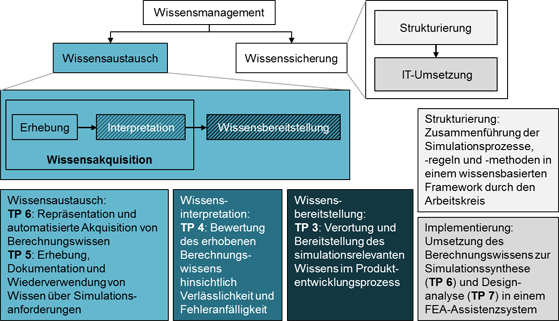Working Group Knowledge Management
Due to the growing product and manufacturing process requirements and shorter development periods the efficiency of the virtual product and process development has to be increased. Thus, the application of knowledge management methods for the exchange and storage of necessary simulation knowledge is essential. Thus, the goal of the WG knowledge management in the research cooperation FORPRO² is to capture and structure the required knowledge about product and process simulation in form of a central knowledge-based framework and to make it available for the research cooperation. The subprojects 3, 4, 5 and 6 are assigned to the WG knowledge management. In a first step an approach for all subprojects must be developed to enable a company to collect and document existing knowledge. One of the key challenges, besides determining the essential factors of the individual simulation context, is the acquisition of knowledge from sources which cannot be analyzed manually because of their wide range (computational models, simulation reports, etc.). At this point the subprojects of the WG can use the results from SP 6. The acquisition process, which is developed in this subproject and based on Data Mining methods, ensures that the knowledge base of the framework is established promptly and maintained permanently. Afterwards the direct and indirect correlations of the knowledge artefacts must be analyzed. At this point, SP 3 supports the WG by providing approaches for structural complexity management. The research work is based on the individual product development processes of the industry partners. SP 3 captures, analyzes and systemizes the simulation processes in the companies involved and transfers the results to a framework on a strategic level. To link this level with the operational level simulation tools like for example the patch optimizer (SP 8) or the 3D surface scanning (SP 10) are broken down in an application-oriented manner on the strategic level so that an optimal provision in the product development process is possible. On the operational level the necessary knowledge is provided context-sensitively for example via computer-aided methods. Because of that, the working group constitutes a link between product development and product production. SP 5 is dealing with the documentation and provision of generic requirements for the simulation. Therefore, a concept to collect and combine these requirements is developed. The degree of concretization is an essential input for SP 3. By this input the needed detail is given and the relevant simulation modules of the framework are selected. Furthermore, processes are clarified that can be used to meet these requirements at a certain time in the product development. The evaluation of simulation quality is carried out by SP 4. Furthermore, SP 4 has to identify the achievement potential of certain tools and to motivate the acquisition of required knowledge inside a company. The captured quality rules are provided and exchanged through appropriate interfaces to transfer the required data to the subprojects. The information and methods from SP 3, 4 and 5 are transferred to an operational level and integrated in software tools by SP 6. This enables the user of a FEA assistance system to perform reliable simulations without detailed prior knowledge. In close cooperation with the WG product simulation new knowledge is generated by evaluating the simulations (SP 7) resulting from the developed methods and processes. Further cooperation with WG product simulation is required to check if the prototype components are within the tolerances specified by the requirement management of SP 5. Therefore, requirements and the actual condition of the components are compared.


Dipl.-Ing. Philipp Kestel
Subproject 6
Leader WG Knowledge Management

Dipl.-Ing. Cristina Carro Saavedra
Subproject 3

Dennis Otten, M.Sc.
Subproject 4

Dr. Hugo d'Albert
Subproject 5

Sebastian Schweigert, M.Sc.
Subprojects 3 and 5